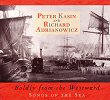List of Songs
TEN STONE
Lead: Richard

| Back to List of Songs |
TEN STONELead: Richard |
 |
A stevedore (cargo loading) shanty from F.T. Bullen & W.F. Arnold’s book Songs of Sea Labour, 1914. Bullen states that the song is a Negro shanty but was not in common use on board ships. Only the first verse of each shanty is given and Bullen points out “The stubborn fact is that they had no set words beyond a starting verse or two and the fixed phrases of the chorus, which were very often not words at all. For all Chanties were impromptu as far as the words were concerned. Many a Chantyman was prized in spite of his poor voice because of his improvisations. Poor doggerel they were mostly and often very lewd and filthy, but they gave the knowing and appreciative shipmates, who roared the refrain, much opportunity for laughter.”
More light is shed on this shanty from the east coast band “The Boarding Party”, whose version we use on this recording and who, in the liner notes for their album Too Far From the Shore, give some details that must have been obtained from a source other than Songs of Sea Labour:
“Ten Stone" comes from a wonderful collection of shanties called Songs of Sea Labour, by F.T. Bullen and W.F. Arnold, published by The Orpheus Music Publishing Company (London) in 1914.LYRICS:Bullen heard this particular song as a "first voyage laddie" in 1869, sung by Negro stevedores loading cargo in the Demerara River near Georgetown, Guyana, on the northern coast of South America. It was used only for cargo loading, and was not in common use aboard ships. Bullen was taken by the singing of the Black gangs, and both he and Arnold felt that virtually all shanties, as well as many forms of gospel music, stemmed from the Negro music of "the southern states and the Antilles."
Bullen, a shantyman himself, states that only the opening verse, refrain lines, and chorus were standard for any given shanty; subsequent verses were improvised, some from other shanties and others made up on the spot. Thus he included only the "standard" portions of the songs, plus the tunes, in his book. In the spirit of improvisation, Jonathan borrowed from other Negro shanties found in Stan Hugill's definitive collection, Shanties from the Seven Seas, to complete the song.
After The Boarding Party had been singing this song for several years, we were told by an audience member in Prince George's County, Maryland, that he had heard "Ten Stone" sung by Black field hands in Eleuthera, Bahamas, to accompany "pickle picking."
I never seen the like since I been born
Chorus: Way hey and a hilo
Jenny with a jib-boom hoein' up corn
Chorus: Way hey and a roll and go
Full chorus:
It's ten stone (ten stone)
Ten stone - the wind am over
Jenny get along, Jenny blow the horn
As we go marchin' over
The possum jump and the panther roar
Been dancin' this dolly since half past four
If the sun don't shine then the hens won't lay
And if you don't work then the boss won't pay
The gals they say, "you're a bunch of liars,"
"You're bound to hell for to feed them fires."
And if you drown while you are young
It's better to drown than to wait to be hung
We dig your ditch with a silver spade
Well there ain't no diggin' in a watery grave